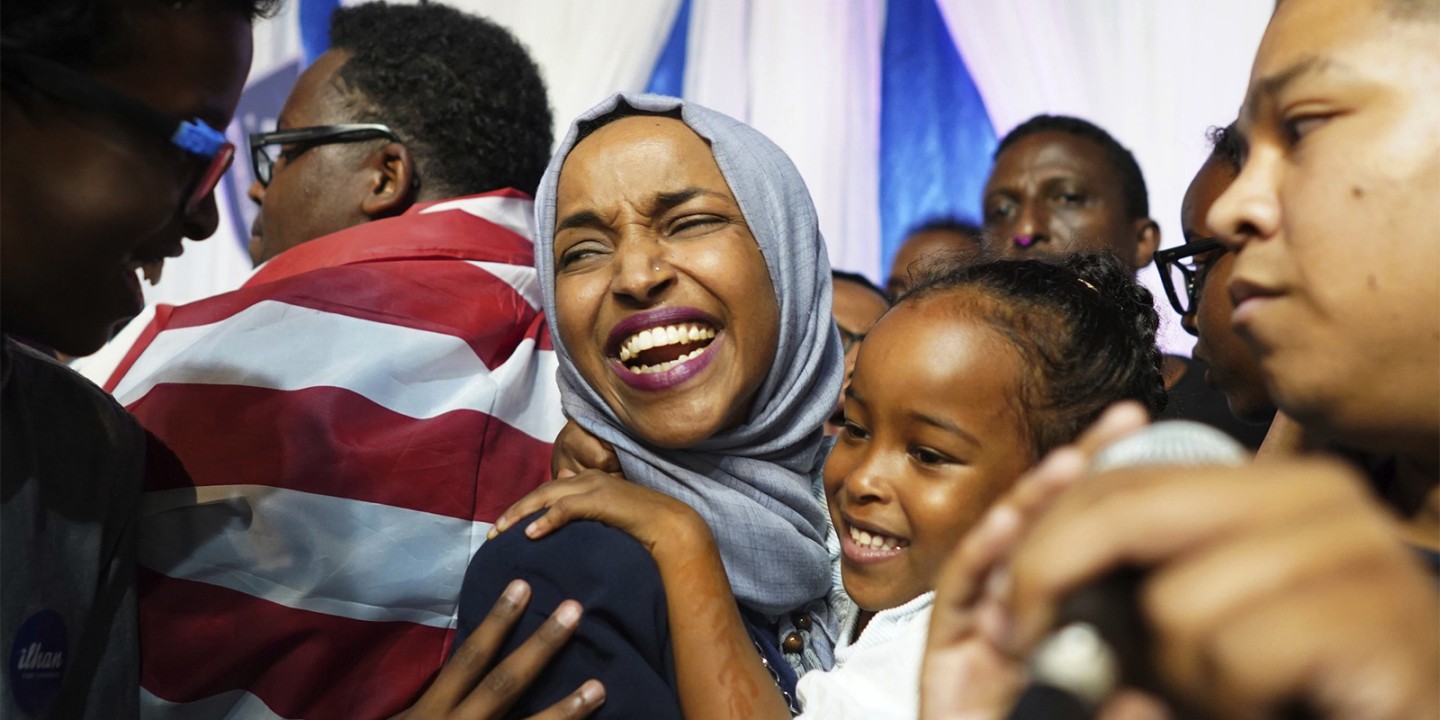Ilhan Omar and Rashida Tlaib to be first Muslim American women in Congress
Both women are seasoned organizers who emphasized economic justice among their priorities.

After winning primaries in August, Ilhan Omar and Rashida Tlaib are poised to be the first two Muslim women to serve in the U.S. Congress.
Omar was born in Somalia, the youngest of seven. Conflict forced emigration, and she spent four years in Utanga refugee camp in Kenya, according to the City Pages, a Twin Cities newspaper. After a Lutheran church sponsored her and her family for entry into the U.S., she arrived at age 12, knowing no English.
“I consider myself to be a fighter who’s pretty optimistic about the possibilities of the world, and someone who thinks we all have shared values regardless of our background, our faith,” she told the City Pages.
Currently a Minnesota state representative, she is the Democratic candidate for the fifth congressional district, which is currently represented by Keith Ellison, a Muslim man. Ellison, one of two Muslim men in Congress, is running for state attorney general.
Read our latest issue or browse back issues.
Omar’s description of herself on social media notes that she is an intersectional feminist and the 2017 Top Angler of the Governor’s Fishing Opener.
Tlaib is the eldest daughter of 14 children born to Palestinian immigrants. She won the Democratic primary for the U.S. House seat long held by former representative John Conyers, in a district that includes much of Detroit and some of its suburbs. There are no Republican or third-party candidates, meaning Tlaib will be unopposed in November.
The first Muslim woman to serve in the Michigan legislature, she served from 2008 to 2014, as long as term limits allow. After that she worked as an attorney for a law center focusing on economic and social justice.
She has been involved in the national Take on Hate campaign against Islamophobia. “I’m not going to allow this world to make my son scared of saying he’s a Muslim,” she told the Detroit Metro Times. On social media she calls herself a “proud Muslima.”
“Rashida and Ilhan’s wins are huge for the Muslim American community,” said Wardah Khalid, founder and president of the Poligon Education Fund, a nonpartisan organization dedicated to getting Muslims more engaged with Congress. “As a fellow Muslim woman, I am inspired by them and know millions across the world feel the same.”
Both women are seasoned organizers who emphasized economic justice among their priorities, including advocating for a $15 minimum wage.
The larger political climate may also be a factor in their wins.
“This is a response to the current political environment and Trump specifically,” said Todd Green, professor of religion at Luther College in Decorah, Iowa, and an expert on Islamophobia. “In many ways, these two political candidates, should they be elected in November, are Trump’s worst nightmare.”
Other Muslim women running to become national legislators included Deedra Abboud, who lost in her bid to be the Democratic candidate for the U.S. Senate from Arizona. She received 19.5 percent of the nearly 400,000 votes, compared to Kyrsten Sinema’s 80.5 percent, according to the New York Times.
Tahirah Amatul-Wadud, 44, who runs a law practice in western Massachusetts, lost the Democratic primary September 4 for a congressional seat held by longtime incumbent Rep. Richard Neal. She campaigned on progressive issues such as Medicare for all. She received 29.2 percent of more than 69,000 votes, while Neal garnered 70.8 percent, the Times reported.
As many as 90 Muslim Americans ran in local, statewide, or national races in recent months, though many of them lost in primary elections, said Shaun Kennedy, cofounder and executive director of Jetpac, a nonprofit group that helps train Muslims to run for elected office.
“It’s the best example of positive response to hardship—dehumanization and xenophobia, and Islamophobia—that has driven many to increase their civic participation,” said Wa’el Alzayat, CEO of Emgage, a civic education and engagement organization. “Rather than cower, hide, run away, and disengage, many are stepping up and responding by being more engaged, whether they’re running for office or voting at a higher rate or joining nonprofits.” —Religion News Service; Christian Century staff
FOLLOWING UP (Updated November 8): Omar and Tlaib won seats in the U.S. House of Representatives, making them the first two Muslim women elected to Congress. According to New York Times election results, Omar, 37, gained 78 percent of the votes in a district that covers Minneapolis and some suburbs. Tlaib, 42, won nearly 89 percent of the vote in her district.
A version of this article appears in the print edition under the title “People: Ilhan Omar and Rashida Tlaib.”






